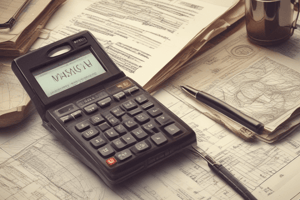Podcast
Questions and Answers
What is the standard VAT rate in South Africa?
What is the standard VAT rate in South Africa?
- 25%
- 10%
- 20%
- 15% (correct)
What is the purpose of checking the total calculation on a till slip?
What is the purpose of checking the total calculation on a till slip?
- To ensure the sum of item prices and VAT is correct (correct)
- To verify the change given to the customer
- To determine the VAT rate applied
- To calculate the interest rate on late payments
What information is NOT included on an account statement?
What information is NOT included on an account statement?
- Transactions
- Item prices (correct)
- Amounts due
- Due dates
What is the term for the amount carried over from the previous statement?
What is the term for the amount carried over from the previous statement?
What type of goods are exempt from VAT in South Africa?
What type of goods are exempt from VAT in South Africa?
What is the purpose of checking the change calculation on a till slip?
What is the purpose of checking the change calculation on a till slip?
What is the primary purpose of verifying the total amount paid and the resulting balance?
What is the primary purpose of verifying the total amount paid and the resulting balance?
What is the formula to calculate the interest when the principal amount, rate of interest, and time are given?
What is the formula to calculate the interest when the principal amount, rate of interest, and time are given?
What type of bill would include charges for services such as water, electricity, and refuse removal?
What type of bill would include charges for services such as water, electricity, and refuse removal?
What is the first step in the summary of steps for working with financial documents?
What is the first step in the summary of steps for working with financial documents?
What is the purpose of calculating the VAT amount on a bill?
What is the purpose of calculating the VAT amount on a bill?
What is the formula to calculate the area of a circle?
What is the formula to calculate the area of a circle?
Flashcards are hidden until you start studying
Study Notes
Financial Documents
- A till slip includes shop details, invoice information, and item details.
- Shop details include name, address, and VAT number.
- Invoice information includes the words "Tax Invoice", invoice number, date, and time of sale.
- Item details include description of items or services, amount of VAT charged (15%), and total amount payable.
VAT (Value Added Tax)
- VAT is a tax on the value added to goods and services.
- The standard VAT rate in South Africa is 15%.
- Certain essential groceries are exempt from VAT, including paraffin, brown bread, maize meal, and other basic foodstuffs.
Checking Calculations
- Verify the sum of item prices and the application of VAT where applicable.
- Ensure that the change given back is correct when a customer pays more than the total amount due.
- Determine unit prices when given pack prices and quantities.
Account Statements
- Some stores allow purchases on credit, with the balance to be paid off monthly.
- Statement details include transactions, amounts due, due dates, previous balances, and available credit.
- Charges and penalties include interest rates applied to late payments and the impact of not paying on time.
Key Terms
- Balance Brought Forward is the amount carried over from the previous statement.
- Credit Available is the remaining credit limit after accounting for the current balance.
- Credit Limit is the maximum amount of credit allowed.
Checking Calculations
- Verify the total amount paid and the resulting balance.
- Calculate interest on overdue payments using the provided annual percentage rate (APR).
Bills
- Municipal bills include charges for services such as water, electricity, and refuse removal.
- Cell phone bills include charges for mobile services, including voice, data, and additional services.
Understanding Bill Details
- Service providers and payment locations are where bills can be paid and whom to contact for queries.
- Payment history includes previous payments and their impact on the current balance.
- Minimum payments are the minimum amount due to avoid additional charges.
Key Concepts
- VAT on bills is the total amount including VAT, which needs to be calculated as a percentage of the base amount.
- Query period is the time allowed to dispute or question a bill.
Checking Calculations
- Ensure the total amount due is correct by verifying the sum of individual charges and the application of VAT.
- Determine average monthly costs based on historical data provided on the bill.
Formulas and Calculations
- Simple Interest: I = P × r × t
- Compound Interest: A = P (1 + (r/n))^(nt)
- VAT Calculation: VAT Amount = Total Amount × (VAT Rate / (100 + VAT Rate))
- Probability: P(E) = Number of favourable outcomes / Total number of possible outcomes
- Area and Volume Calculations:
- Area of a Circle: A = πr^2
- Volume of a Rectangular Prism: V = l × w × h
Summary of Steps
- Verify information: Check that all required details are present on financial documents.
- Perform calculations: Use the appropriate formulas to verify totals, interest, VAT, and other relevant calculations.
- Check for exemptions: Identify items that are exempt from VAT and adjust calculations accordingly.
- Understand terms: Familiarize yourself with key financial terms and their implications on bills and account statements.
- Accuracy: Ensure all arithmetic operations are correct and that rounding rules are followed when necessary.
Studying That Suits You
Use AI to generate personalized quizzes and flashcards to suit your learning preferences.
Description
Learn about the key information included on till slips, such as shop details, invoice information, and item details, as well as the basics of Value Added Tax (VAT) in South Africa.




